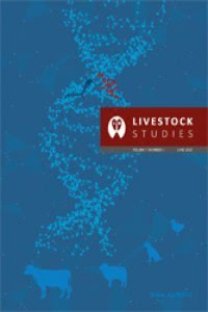LİMOZİN X JERSEY (F1) MELEZİ TOSUNLARDA ZEOLİTİN BESİ PERFORMANSI VE KARKAS ÖZELLİKLERİNE ETKİSİ
Bu çalışma, konsantre yeme % 1.5 oranında katılan zeolitin Limozin x Jersey melezi sığırlarda besi performansı ile kesim ve karkas özellikleri üzerine etkisini incelemek amacıyla yapılmıştır. Araştırmada 12 – 18 aylık 12 baş erkek besi sığırı kullanılmıştır. 131 gün süreli besi denemesi herbirinde 6 baş hayvan bulunan iki grup halinde yürütülmüştür. Kontrol grubu rasyonuna zeolit katılmamıştır. Besi hayvanlarına konsantre yem ile buğday samanı veya şeker pancarı posası canlı ağırlıkları esas alınarak verilmiştir. Rasyon % 80 konsantre + % 20 kaba yem karışımı (% 85 yaş şeker pancarı posası + 15 buğday samanı şeklinde oluşturulmuştur. Gruplarda ortalama besi sonu ağırlıkları sırasıyla 333.25 ve 354.83 kg; deneme süresince elde edilen günlük ortalama canlı ağırlık artışı ise kontrol grubunda 1132 g; deneme grubunda 1246 g. şeklinde bulunmuştur. Zeolit içeren konsantre yemle beslenen deneme grubu lehine olan bu farklılıklar istatistik bakımdan önemli bulunmamıştır (P>0.05). Grup yemlemesi uygulanan bu çalışmada gruplarda toplam kuru madde tüketimi ile yemden yararlanma derecesi sırasıyla 8.896 ve 9.247 kg; 7.860 ve 7.418 kg olarak tespit edilmiştir. Bu sonuçlara göre zeolit verilen deneme grubunun kontrol grubuna göre yemi % 5.63 oranında daha iyi değerlendirdiği ileri sürülebilir. Besi sonunda soğuk karkas ve karkasta toplam et ağırlıkları kontrol grubunda 188.60 – 148.23 kg. deneme grubunda ise 204.20 – 161.00 kg olup, gruplar arası farklılıklar önemli bulunmuştur (P0.05). Diğer karkas özellikleri bakımından gruplar arasında ortaya çıkan farklılıklar önemlilik arzetmemiştir. Bu çalışmanın sonuçlarına göre besi sığırları konsantre yemine % 1.5 oranında zeolit katılmasının besi performansı ile kesim ve karkas özelliklerini olumlu yönde etkilediği, dolayısıyla besi sığırı rasyonlarında bu miktarlarda kullanılmasının yararlı olacağı kanısına varılmıştır.
Anahtar Kelimeler:
Zeolit, besi sığırı, besi performansı, kesim ve karkas özellikleri
(The Effects of Zeolite on Fattening Performance and Carcass Characteristics of Limozin x Jersey (Fı) Crossbred bulls.)
This study was carried out to investigate the effects of zeolite (1.5 %) added to the ration, on the fattening performance, slaughtering and carcass characteristics of Limousin x Jersey crossbred beef cattIe. Totally 12 male beef cattle, 12 -18 months old were used in two groups. The research groups were consisted of 6 animals, 6 animals as control group did not received zeolite in their ration. The rations of the groups contained 80 % concentrates and 20 % roughages consisting of 85% sugar beet pulp and 15% wheat straw. All animals were fed according to the live weight of animals. The average of final weights of beef cattle in the groups were 333.25 and 354.80 kg respectively. Overall daily weight gain was found to be 1132 g in the control group; 1246 g in the experimental group. The differences between the groups were found to be nonsignificant. The average daily dıy matter consumptions were 8.896 and 9.247 kg for all groups respectively. On the other hand, the average total dry matter consumptions per kg weight gain were 7.860 and 7.418 kg, respectively. According to the results, it would be concluded that zeolite group improved the feed conversion rate more than the control group at the level of 5.63 %. At the end of the fattening period, the average cold carcass weights and the average total meat weights in the carcass were found to be 188.60 and 148.23 kg for the control group; 204.20 and 161.00 kg for the experiment group. The differences between the groups with the respect to these values were statistically significant (P<0.05). The average hot and cold dressing percentages were found to be 56.71 and 55.54 % in the control group; 56.54 and 55.39 % in the group fed zeolite (P>0.05). The differences between control and experiment groups with respect to other carcass rneasurernents were not significant (P>0.05). According to the results of this research, it is concluded that 1.5 % zeolite added to the ration has positive effect on fattening performance and slaughtering and carcass characteristics. Therefore, addition of zeolite in this level to the beef cattles ration would be beneficial
- Yayın Aralığı: Yılda 2 Sayı
- Başlangıç: 1959
- Yayıncı: Sezer ÖZ
Sayıdaki Diğer Makaleler
İTHAL SİMENTAL SIĞIRLARIN KAZOVA TARIM İŞLETMESİ ŞARTLARINDA BÜYÜME VE YAŞAMA GÜCÜ
Yakup DELİÖMEROĞLU, Orhan ALPAN, Ali BAKIR
ERBRO IRKI HOROZ SPERMALARININ FARKLI SULANDIRICI VE KRYOPROTEKTANLARLA DONDURULMASI
Ongun KESKİN, Necmettin TEKİN, Ergun AKÇAY
LİMOZİN X JERSEY (F1) MELEZİ TOSUNLARDA ZEOLİTİN BESİ PERFORMANSI VE KARKAS ÖZELLİKLERİNE ETKİSİ
İrfan ÇOLPAN, Şakir Doğan TUNCER, Ahmet G. ÖNOL, Gültekin YILDIZ
ETÇİ IRKLAR X MERİNOS MELEZİ F1 KOYUNLARIN YAPAĞI VERİM VE ÖZELLİKLERİ
Ümran ŞAHAN, Mehmet KOYUNCU, Vedat AKGÜNDÜZ, Fazıl DELİGÖZOĞLU
ERKEK DAMIZLIKLARIN SEÇİMİNDE DÖLVERİMİ VE BULAŞICI HASTALIKLAR YÖNÜNDEN MUAYENELER
RUMEN İÇERİĞİNİN KUZU RASYONLARINDA KULLANILMA OLANAKLARININ ARAŞTIRILMASI
